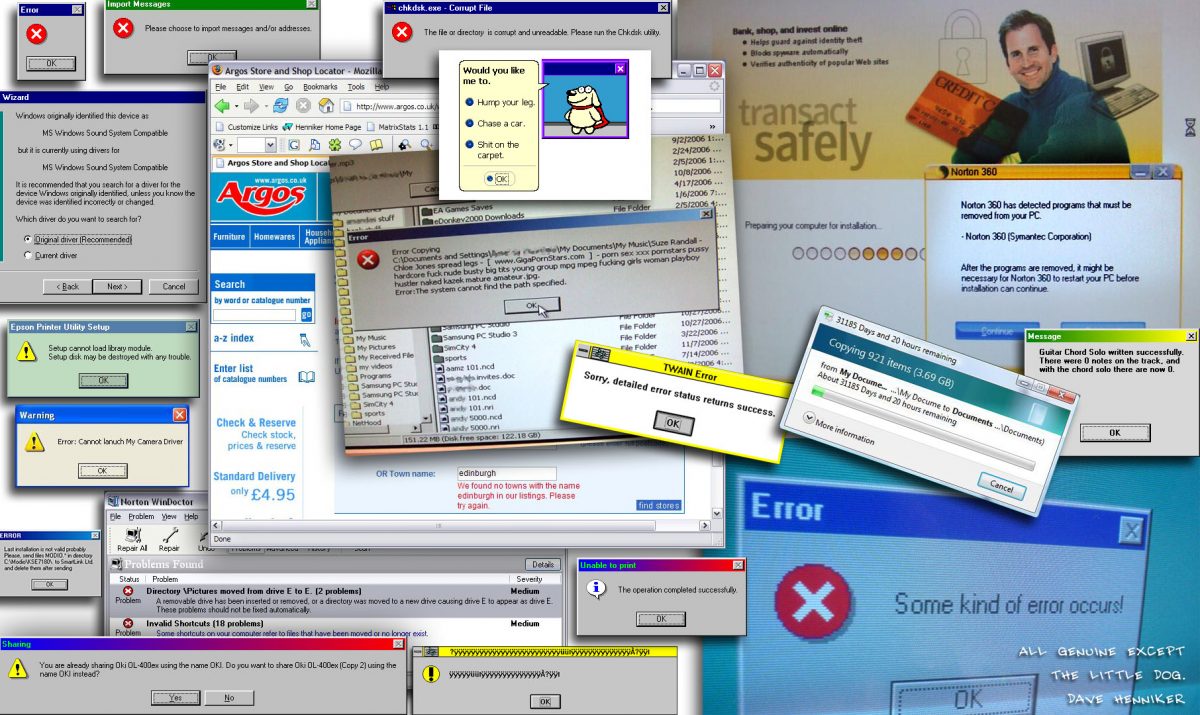I first created a page with the same title, probably in 2003. In 2018 I’ve made this WordPress version. I retired in 2009 so reworking this has been a nostalgia trip for me. Earlier years were spent working as a TV engineer and interesting recollections are at The Telly Man page.
<cogitate>
[The following was written before cellphones and tablets became established]More and more, computers are part of our lives. In just a few short years the home computer has changed from being a specialist item into something few people can function without. Convergence is a term bandied about as the home computer evolved into a home entertainment system and much more.
PC service technicians are well aware of the trend for people to store their lives on their hard disk. Tech guys spend ever more time and effort trying to reunite computer users with their data, whether it be photos of family and friends, holiday snaps, important documents or a vast collection of movies or music.
Most people can’t get to grips with something so nebulous as computer data or software. Many have blind faith that the photos they’ve transferred onto the PC will always be there.
One of the worst computers to rescue data from is the family PC with several users – especially if they’re teenagers or naive 20-somethings. A typical scenario is that there’s, say, 4 users but a dozen user accounts because people have screwed up their original user accounts with careless use of dodgy file sharing. Some of them will think it’s really cool to misspell their name with upper and lower case characters and symbols from Character Map.
So in the Documents and Settings folder or equivalent, there will be lots of folders with users’ names and in these folders there will be data to be recovered, or there may be nothing at all except Windows defaults and sample picture and music etc. But you’ve got to look to see. And you’ve got to look in the various users’ Desktop folders to see if they’ve saved a few gigabytes there.
Poking around in other people’s photos and music collections is mostly mundane and boring but can be quite stressful for technicians who are trying to navigate around complicated folder structures and decide what’s valuable data and what’s not, only to be interrupted by a customer at the counter who’s bought the wrong ink cartridge.
At PC World we never explored customers’ hard disks for fun or amusement. We’ve seen it all before and it’s boring and predictable, apart from which there are too many tasks demanding our attention. In my case it’s all in the past tense since I retired in July 2009.
If a PC fails to boot into Windows then the user is likely to panic if they haven’t backed up all their stuff, thinking it may be gone forever, in a puff of logic – as Douglas Adams might say. There really is no excuse for not having duplicate copies on an external hard disk or flash drive or remote backup service. Why not buy a flash drive for next to nothing, bung your important stuff on it and give it to a friend or family member? Then you’ll still have your stuff even if your house burns down.
Data Recovery and Data Retrieval may appear to be much the same thing, but the former may be free of further charge if a service agreement is active – whereas the latter may be always chargeable. Data Recovery implies a corrupt file structure which an in-store IBAS system running Linux could repair. The license provided by OnTrack and other licensing agreements made this the official method for recovering data.
There’s an abundance of free software out there to retrieve and recover data but it’s not licensed to be used in a corporate environment. My favourite bootable disc was my customised version of Ultimate Boot CD. I’ve seen magazine cover discs with ISOs so readers could burn a bootable Linux CD with CDRW software included. The resultant CD, only 28MB of files, would allow the user to browse files on a broken Windows system and save pictures and music etc to a CDR.
The thing is, lots of PC users haven’t thought of the obvious things like having a look at the big selection of computer magazines in the shops. For some, it’s a moment of divine inspiration (or something) when you swivel round an Eclipse screen and show them the wonders of Google. They’ve had a problem but never thought of looking for the answer online. Instead, they drove miles and queued up at the PC Clinic counter.
<cogitate/>
Home

